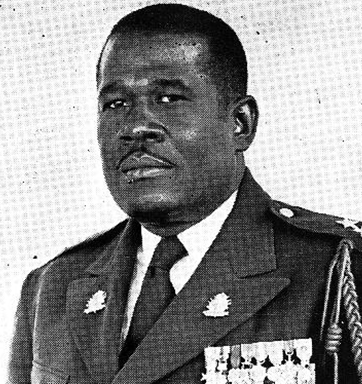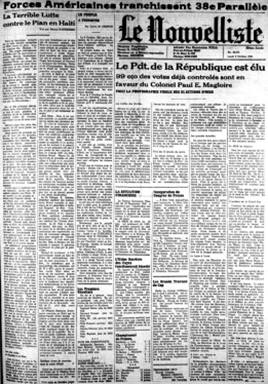"Magloire’s Rise to the Presidency" by the Island Luminous Editorial Board
In the end, President Estimé would not survive the radical politics unleashed in 1946. He was unable to appease his critics who believed he was either too conservative or too extreme. When the Senate turned down Estimé’s proposal to revise the constitution to allow him another term as president, the military intervened, much like it had in 1946, to prevent political instability and oversee a transition in power. The provisional junta was led by the same servicemen who headed the Comité Exécutif Militaire in 1946: Frank Lavaud, who was now a general, and Antoine Levelt and Paul Magloire, who were now colonels. This time, however, it was Magloire, not Lavaud, who oversaw the transition.
The three men, Magloire, Lavaud, and Levelt, appeared in the capital city on 10 May 1950 to state the military’s intentions. "Since last April, the country has traversed a complicated and dangerous situation that has suspended the nation," they explained in a proclamation printed in le Moniteur. "The President of the Republic [Estimé] lost control of events which developed very quickly behind the ambitions of certain individuals ever since the Senate rejected the revisions to the constitution. Given the inextricable state of things and the country’s inability to continue in peace and calm, the army has decided, by order of its leaders, to take the necessary measures to safeguard public peace so that we will not end up in an incontrollable situation." They assured, "like we have done in the recent past, we will fully respect the international agreements made by the Republic of Haiti, maintain democratic standards, and ensure public safety and respect for property." The military asked Senator Dantès Bellegarde to oversee revisions to the constitution. And, together, the military and the Senate organized a new presidential election. Unlike earlier contests, the vote was open to every male citizen over 21. Anxious to win the presidency, Magloire quit the provisional government and announced his own candidacy. Convinced that the army would engineer the vote so that Magloire would win, nearly every other politician, all but one, boycotted the election. On 10 October that year, Magloire was elected president.
At his inauguration in December, Magloire spoke to the nation. "This soldier says to you, thank you." To the very end, he promised, he would always be a soldier: "We are at the nation’s disposition and we do not disobey orders." Once more Magloire took on the task given to Haiti’s military by the United States during the occupation thirty years earlier. He would prevent instability. Military intervention was now a precedent and would reoccur in 1986 and 1991. Between 1957 and 1985, however, Magloire’s successors, the Duvaliers, took action to prevent it. They created a militia, the Tonton Macoutes, which rivaled the military, as it terrorized civil society.

